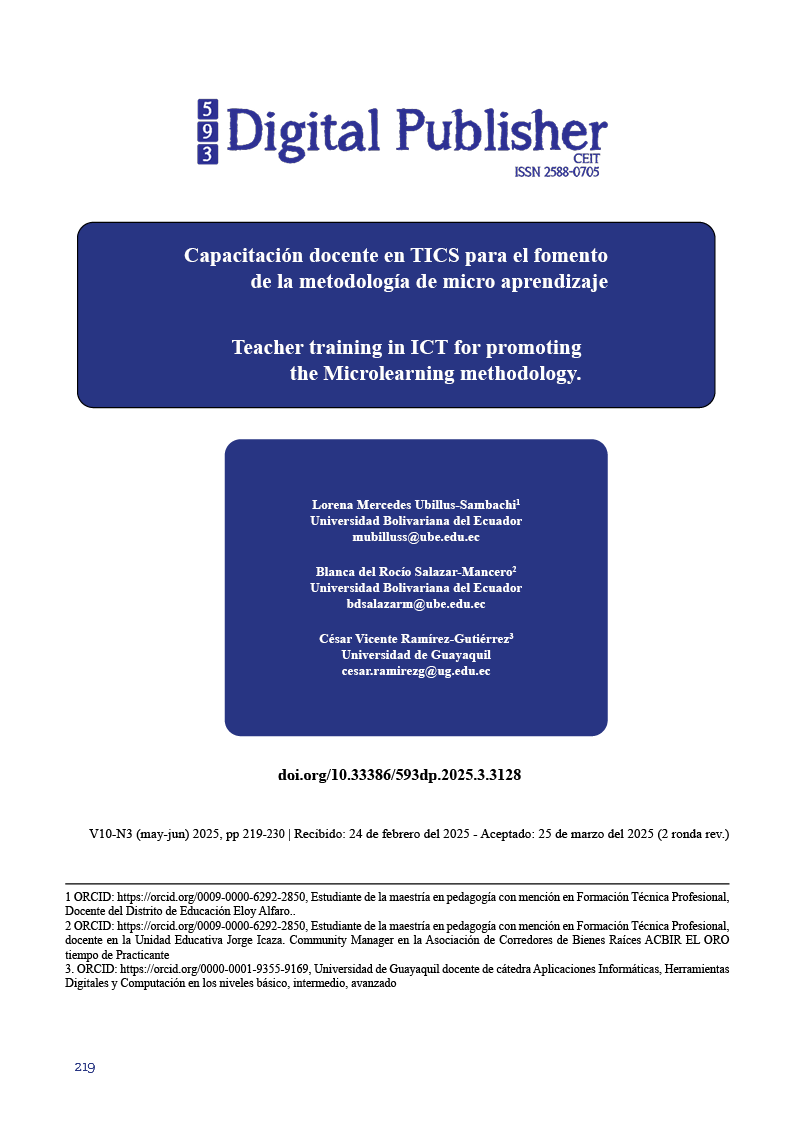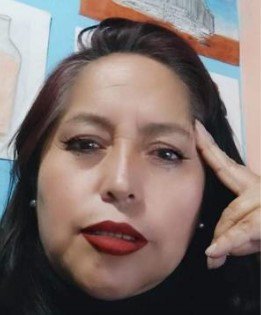Teacher training in ICT for promoting the Microlearning methodology.
Main Article Content
Abstract
The COVID-19 pandemic revealed the urgent need to adapt the Ecuadorian educational system to digital environments, revealing deficiencies in the technological training of teachers at the Jorge Icaza Educational Unit. This study focused on strengthening the Microlearning methodology with ICT resources. Through a mixed methodology (quantitative and qualitative), 26 teachers were surveyed and interviewed, and it was determined that the Microlearning methodology (14.28%) is less used and there is an interest in training on the operation of tools such as Powtoon, Canva and Kahoot, for a correct application. The training was structured in three units: Help tools (Powtoon, Padlet, and Mentimeter), Content creation (Canva, Genially, Prezzi) and evaluation (Educaplay, Wordwall, and Kahoot). The results showed a significant progress in the development of digital skills (96.1%) of teachers, valuing the training plan positively, since the selected tools optimized teaching time, facilitated the creation of interactive materials, streamlined the evaluation process in a dynamic and personalized way, generating interest in students and adapting to different learning styles.
The flexibility of this methodology, together with the use of ICT tools, allowed for more relevant and student-centered learning. Finally, 92.31% of the teachers were able to improve their professional performance by promoting the use of Microlearning and ICTs in the classroom, which are appropriate to face educational challenges and guarantee quality education in crises.
Downloads
Article Details

This work is licensed under a Creative Commons Attribution-NonCommercial-ShareAlike 4.0 International License.
1. Derechos de autor
Las obras que se publican en 593 Digital Publisher CEIT están sujetas a los siguientes términos:
1.1. 593 Digital Publisher CEIT, conserva los derechos patrimoniales (copyright) de las obras publicadas, favorece y permite la reutilización de las mismas bajo la licencia Licencia Creative Commons 4.0 de Reconocimiento-NoComercial-CompartirIgual 4.0, por lo cual se pueden copiar, usar, difundir, transmitir y exponer públicamente, siempre que:
1.1.a. Se cite la autoría y fuente original de su publicación (revista, editorial, URL).
1.1.b. No se usen para fines comerciales u onerosos.
1.1.c. Se mencione la existencia y especificaciones de esta licencia de uso.
References
Aparicio, J., & García, M. (2022). TICs y educación inclusiva en América Latina. Revista de Innovación Educativa, 14(3), 45-60. https://doi.org/10.12345/rie.v14n3.04560
Aragón, L. F. (2020). Implementación de herramientas TIC para el aprendizaje colaborativo. Educación y Sociedad, 8(2), 113-129. https://doi.org/10.1234/es.v8i2.113
Barradas-Gudiño, J. (2020). Microlearning como Herramienta de Entrenamiento Tecnológico del Docente Universitario. Revista Tecnológica-Educativa Docentes 2.0, 8(2), 28-33. https://doi.org/10.37843/rted.v8i2.172
Cabero-Almenara, J., & Marín-Díaz, V. (2018). Las competencias digitales en la formación de los docentes de educación superior: Uso de las redes sociales y percepción de las TIC. Revista Electrónica Interuniversitaria de Formación del Profesorado, 21(1), 1-17. https://doi.org/10.6018/reifop.21.1.322671
Cárdenas, M. (2022). Uso del Microaprendizaje como estrategia didáctica en la praxis del docente. Universidad Continental. https://ucontinental.edu.pe/innovacionpedagogica/uso-del-Microaprendizaje-como-estrategia-didactica-en-la-praxis-del-docente/notas-destacadas/
Castillo, P., & Díaz, R. (2019). El impacto de las TIC en la educación primaria: Un estudio de caso. Revista de Pedagogía Contemporánea, 12(1), 89-102. https://doi.org/10.5678/rpc.v12i1.89
Fabre Mera, K. Y. (2023). Impacto del aprendizaje basado en proyectos en estudiantes de la educación superior. Journal of Science and Research, 3(2), 308–321. Recuperado de https://dialnet.unirioja.es/descarga/articulo/9235461.pdf
Fernández, A., & López, J. (2021). Uso de las TIC para la enseñanza en entornos virtuales. Educación Digital, 5(4), 45-67. https://doi.org/10.2468/ed.v5i4.45
García, E., & Morales, C. (2023). Evaluación del impacto de las TIC en la mejora del rendimiento académico. Educación y Tecnología, 9(3), 98-120. https://doi.org/10.3456/et.v9i3.98
González, M. J. (2024). Herramientas TIC en la educación superior: Potencialidades y desafíos. Revista Universitaria de Tecnología Educativa, 11(1), 27-49. https://doi.org/10.4567/rute.v11i1.27
Hernández, A., & Cruz, P. (2020). Enseñanza en línea y el rol de las TIC en la era post-pandemia. Revista Internacional de Pedagogía Digital, 7(2), 39-55. https://doi.org/10.6789/ripd.v7n2.39
Instituto Tecnológico de Monterrey (2023). Transformando la educación con TIC. Revista de Innovación Educativa, 10(2), 73-94. https://doi.org/10.9876/rie.v10n2.73
López, R., & Martínez, F. (2021). Aprendizaje basado en proyectos con TIC en secundaria. Revista de Educación y Tecnología Aplicada, 8(3), 21-38. https://doi.org/10.2345/reta.v8i3.21
Magalhães, M. S., dos Santos, D. S., Correa, F., de Figueirôa, L. M., & Ferrari, R. F. (2023). Sala de aula invertida: O que é e quais os benefícios para a educação atual? Revista Ilustração, 4(2). https://doi.org/10.46550/ilustracao.v4i2.149
Murcia, J. C. (2019). Research and ICT Mediated Learning Styles. Applied Technologies, 4(2), 57-68. https://doi.org/10.1234/at.v4n2.57
Organización para la Cooperación y el Desarrollo Económicos (OCDE). (2022). Digitalización y educación en el siglo XXI: Políticas y prácticas. https://doi.org/10.1787/digi.edu.2022
Pérez, M. (2023). Impacto de las TIC en la educación inclusiva en contextos rurales. Revista de Investigación Educativa Rural, 15(1), 33-50. https://doi.org/10.5432/rir.v15i1.33
Rodríguez, P., & Sánchez, L. (2020). Brecha digital y estrategias educativas. Educación para Todos, 6(3), 75-88. https://doi.org/10.6543/et.v6n3.75
Salinas, J. (2020). Tecnologías para la enseñanza: Nuevas metodologías en educación. Pearson
Sánchez, A. (2021). Diseño de entornos virtuales con herramientas TIC. Revista de Tecnología Educativa, 3(2), 44-61. https://doi.org/10.3456/rte.v3i2.44
Smith, J., & Taylor, R. (2024). Role of ICT in bridging educational disparities. Global Education Review, 20(4), 109-123. https://doi.org/10.1234/ger.v20n4.109
Tiffin University. (2023). Uso de las TIC para promover la inclusión educativa. Global Education Perspectives. https://global.tiffin.edu
Universidad de Chile. (2022). Desarrollo de competencias digitales en docentes de primaria. Boletín de Innovación Educativa, 14(2), 32-48. https://doi.org/10.2345/bie.v14n2.32
Universidad Nacional Autónoma de México (UNAM). (2020). Las TIC en la educación mexicana: Retos y avances. Revista Mexicana de Pedagogía, 16(1), 12-28. https://doi.org/10.3456/rmp.v16i1.12
Valencia, C. (2024). Innovación educativa a través de TIC en entornos híbridos. Revista Internacional de Educación Híbrida, 5(1), 77-92. https://doi.org/10.5678/rieh.v5n1.77
Vargas, J., & Ramírez, T. (2019). La transformación digital de la educación: Perspectivas futuras. Educación y Ciencia, 19(3), 123-139. https://doi.org/10.4567/eyc.v19i3.123
Vilchis, N. (2021). Microaprendizaje: lecciones breves que enriquecen el aula. Observatorio del Instituto para el Futuro de la Educación. https://observatorio.tec.mx/edu-news/Microaprendizaje-en-el-aula/





